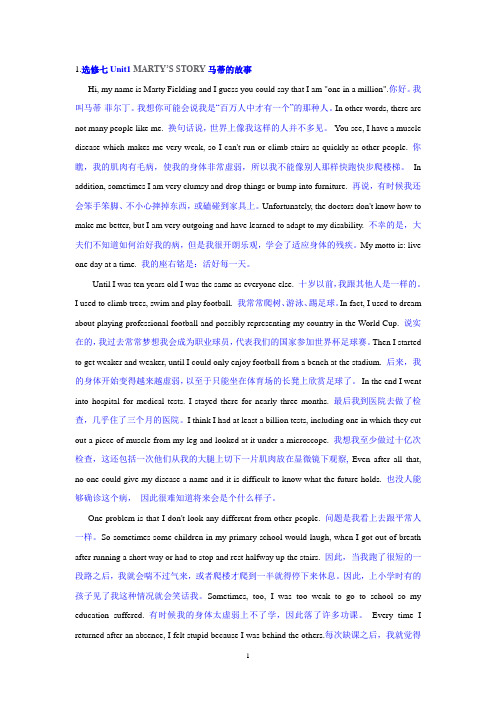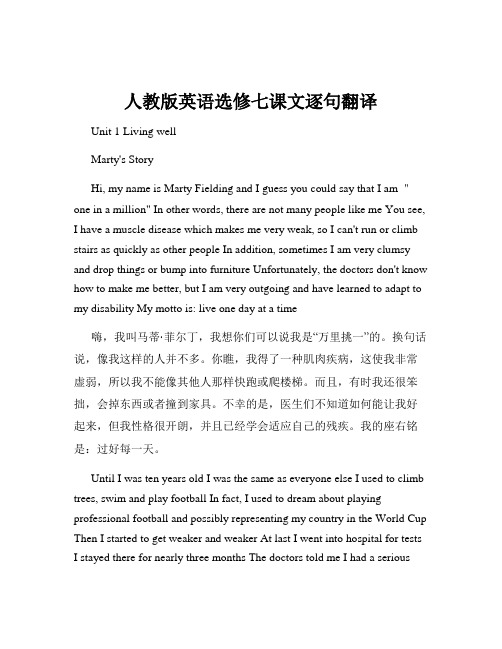英语选修七第四单元课文及翻译
高中英语选修7 课文翻译

好好生活马蒂的故事你好。
我叫马蒂?菲尔丁。
我想你可能会说我是"百万人中才有一个"的那种人物。
换句话说,世界上像我这样的人并不多见。
你瞧,我的肌肉有毛病,它有时候会使我的身体非常虚弱。
我不能像别人那样快跑或快步爬楼梯。
再说,有时候我还会笨手笨脚、摔掉东西,或磕碰到家具上。
医生也说不.清我到底得了什么毛病,所以也就没法给我治好。
不幸的是,他们也不能告诉我,我的病是否会随着年龄的增长而恶化,或者还是保持现状。
我已经学会了适应我的残疾生活。
我的座右铭是:活一天算一天。
大约在十岁以前,我跟班里的其他同学是一样的,我常常爬树、游泳、踢足球。
说实在的,我过去常梦想过将来有一天我会成为足球名将,代表我们的国家参加世界杯足球赛昵。
后来,我的身体开始变得越来越虚弱。
有些日子我疲惫得起不了床。
我到医院去作了检查。
几乎住了三个多月的医院,缺了许多课。
我想我住医院的时候,做过无数次检査了,包括有一次检查,他们从我的腿部切下一小块儿肌肉,放在显微镜下观察。
即使做过所有这些检査之后,也没有人能够确诊这个病。
因此,很难知道将来会是个什么样子。
关于我的病,最糟糕的是,我看上去跟平常人一样。
因此,当我跑了很短的一段路之后,我就会喘不过气来,或者爬楼梯才爬到一半就得停下,爬不到顶就得休息。
因此,有时小孩子们见了我这种情况就会笑话我。
有时候我的身体太虚弱,上不了学,因此落了许多课。
每次请过长假之后,我真的觉得自己很笨,因为我比别人落后了一些。
我在中学时期的生活比在小学时要轻松多了。
我的同学开始接受了我的状况。
当然总会有些同学看不到我的内心世界,但是我并不生气,只是不去理会他们罢了。
总而言之,我生活得挺好。
我很高兴发现有许多事情我的确能做得很好,比如写作和编电脑程序。
我有雄心壮志,长大后我要在电脑行业里工作。
去年我发明了一个电脑足球游戏,有一家大公司已经决定从我这儿把它买走。
我的生活很充实,没有时间闲坐着来为自己忧伤。
【人教版】2019版高中英语选修7课文逐句翻译

1.选修七Unit1 MARTY’S STORY马蒂的故事Hi, my name is Marty Fielding and I guess you could say that I am "one in a million".你好。
我叫马蒂·菲尔丁。
我想你可能会说我是“百万人中才有一个”的那种人。
In other words, there are not many people like me. 换句话说,世界上像我这样的人并不多见。
You see, I have a muscle disease which makes me very weak, so I can't run or climb stairs as quickly as other people. 你瞧,我的肌肉有毛病,使我的身体非常虚弱,所以我不能像别人那样快跑快步爬楼梯。
In addition, sometimes I am very clumsy and drop things or bump into furniture. 再说,有时候我还会笨手笨脚、不小心摔掉东西,或磕碰到家具上。
Unfortunately, the doctors don't know how to make me better, but I am very outgoing and have learned to adapt to my disability. 不幸的是,大夫们不知道如何治好我的病,但是我很开朗乐观,学会了适应身体的残疾。
My motto is: live one day at a time. 我的座右铭是:活好每一天。
Until I was ten years old I was the same as everyone else. 十岁以前,我跟其他人是一样的。
I used to climb trees, swim and play football. 我常常爬树、游泳、踢足球。
【人教版】2019版高中英语选修7课文逐句翻译(Word版,15页)

1.选修七Unit1 MARTY’S STORY马蒂的故事Hi, my name is Marty Fielding and I guess you could say that I am "one in a million".你好。
我叫马蒂·菲尔丁。
我想你可能会说我是“百万人中才有一个”的那种人。
In other words, there are not many people like me. 换句话说,世界上像我这样的人并不多见。
You see, I have a muscle disease which makes me very weak, so I can't run or climb stairs as quickly as other people. 你瞧,我的肌肉有毛病,使我的身体非常虚弱,所以我不能像别人那样快跑快步爬楼梯。
In addition, sometimes I am very clumsy and drop things or bump into furniture. 再说,有时候我还会笨手笨脚、不小心摔掉东西,或磕碰到家具上。
Unfortunately, the doctors don't know how to make me better, but I am very outgoing and have learned to adapt to my disability. 不幸的是,大夫们不知道如何治好我的病,但是我很开朗乐观,学会了适应身体的残疾。
My motto is: live one day at a time. 我的座右铭是:活好每一天。
Until I was ten years old I was the same as everyone else. 十岁以前,我跟其他人是一样的。
I used to climb trees, swim and play football. 我常常爬树、游泳、踢足球。
最新66高中英语选修7课文逐句翻译(人教版)资料

7.选修七Unit4 A LETTER HOME一封家信Dear Rosemary, 亲爱的罗斯玛丽:Thanks for your letter, which took a fortnight to arrive. 谢谢你的来信,这封信两星期才到。
It was wonderful to hear from you. 收到你的信真是太高兴了。
I know you're dying to hear all about my life here, so I've included some photos which will help you picture the places I talk about. 我知道你急于了解我在这儿的生活情况。
因此,我在信中附有几张照片,能够帮助你想象出我所谈到的地方。
You asked about my high school. 你问起我的中学情况。
Well, it's a bush school –the classrooms are made of bamboo and the roofs of grass. 噢,它是一所丛林学校——教室是用竹子搭起来的,屋顶是用茅草盖的。
It takes me only a few minutes to walk to school down a muddy track. 我只要沿着一条泥泞的小路步行几分钟就到学校了。
When I reach the school grounds there are lots of "good mornings" for me from the boys. 每当我走到学校操场的时候,迎接我的是男孩子们一片“早上好”的声音。
Many of them have walked a long way, sometimes up to two hours, to get to school.他们中许多人走了很长的路,有时候要走两个小时才能到学校。
人教版高中英语选修7课文翻译

马蒂的故事你好。
我叫马蒂.菲尔丁。
我想你可能会说我是“百万人中才有一个”的那种人。
换句话说,世界上像我这样的人并不多见。
你瞧,我的肌肉有毛病,使我的身体非常虚弱,所以我不能像别人那样快跑或快步爬楼梯。
再说,有时候我还会笨手笨脚、不小心摔掉东西,或磕碰到家具上。
不幸的是,大夫们不知道如何治好我的病,但是我很开朗乐观,学会了适应身体的残疾。
我的座右铭是:活一天算一天。
十岁以前,我跟其他人是一样的。
我常常爬树、游泳、踢足球。
说实在的,我过去常常梦想我会成为职业球员,代表我们的国家参加世界杯足球赛。
后来,我的身体开始变得越来越虚弱,以至于只能坐在体育场的长凳上欣赏足球了。
最后我到医院去做了检查,几乎住了三个月的医院。
我想我至少做过十亿次检查了,包括有一次检查,他们从我的腿部切下一小块儿肌肉,放在显微镜下观察。
即使做过了所有这些检查,也没有人能够确诊这个病。
因此,很难知道将来会是个什么样子。
问题是我看上去跟平常人一样。
因此,当我跑了很短的一段路之后,我就会喘不过气来,或者爬楼梯才爬到一半就得停下来休息。
因此,上小学时有的孩子见了我这种情况就会笑话我。
有时候我的身体太虚弱,上不了学,因此落了许多功课。
每次缺课之后,我就觉得自己很笨,因为我比别人落后了。
我在中学时期的生活(比在小学时)要轻松多了,因为我的同学开始接受了我的状况。
还有些同学看不到我的内心世界,但是我并不生气,只是不去理会他们罢了。
总而言之,我生活得挺好。
我很高兴我能做许多事情,比如写作和电脑编程。
我有雄心壮志,长大后我要在开发电脑软件的公司里工作。
去年我发明了一个电脑足球游戏,有一家大公司已经决定从我这儿买走。
我的生活很充实,没有时间闲坐着顾影自怜。
除了同我的朋友一起去看电影和足球比赛,我还花很多时间和我的宠物在一起。
我有两只兔子、一只鹦鹉、一缸金鱼和一只乌龟。
我得花大量时间来照顾这些宠物,但我觉得很值。
此外,我还有好多功课,特别是在病了一段时间之后。
高中英语选修7课文逐句翻译(人教版).doc

1.选修七Unit1 MARTY’S STORY马蒂的故事Hi, my name is Marty Fielding and I guess you could say that I am "one in a million".你好。
我叫马蒂·菲尔丁。
我想你可能会说我是“百万人中才有一个”的那种人。
In other words, there are not many people like me. 换句话说,世界上像我这样的人并不多见。
You see, I have a muscle disease which makes me very weak, so I can't run or climb stairs as quickly as other people. 你瞧,我的肌肉有毛病,使我的身体非常虚弱,所以我不能像别人那样快跑快步爬楼梯。
In addition, sometimes I am very clumsy and drop things or bump into furniture. 再说,有时候我还会笨手笨脚、不小心摔掉东西,或磕碰到家具上。
Unfortunately, the doctors don't know how to make me better, but I am very outgoing and have learned to adapt to my disability. 不幸的是,大夫们不知道如何治好我的病,但是我很开朗乐观,学会了适应身体的残疾。
My motto is: live one day at a time. 我的座右铭是:活好每一天。
Until I was ten years old I was the same as everyone else. 十岁以前,我跟其他人是一样的。
I used to climb trees, swim and play football. 我常常爬树、游泳、踢足球。
人教版英语选修七课文逐句翻译

人教版英语选修七课文逐句翻译Unit 1 Living wellMarty's StoryHi, my name is Marty Fielding and I guess you could say that I am "one in a million" In other words, there are not many people like me You see, I have a muscle disease which makes me very weak, so I can't run or climb stairs as quickly as other people In addition, sometimes I am very clumsy and drop things or bump into furniture Unfortunately, the doctors don't know how to make me better, but I am very outgoing and have learned to adapt to my disability My motto is: live one day at a time嗨,我叫马蒂·菲尔丁,我想你们可以说我是“万里挑一”的。
换句话说,像我这样的人并不多。
你瞧,我得了一种肌肉疾病,这使我非常虚弱,所以我不能像其他人那样快跑或爬楼梯。
而且,有时我还很笨拙,会掉东西或者撞到家具。
不幸的是,医生们不知道如何能让我好起来,但我性格很开朗,并且已经学会适应自己的残疾。
我的座右铭是:过好每一天。
Until I was ten years old I was the same as everyone else I used to climb trees, swim and play football In fact, I used to dream about playing professional football and possibly representing my country in the World Cup Then I started to get weaker and weaker At last I went into hospital for tests I stayed there for nearly three months The doctors told me I had a seriousdisease and that I might not live much longer I was in shock I think my parents were too They didn't know what to do直到十岁,我都和其他人一样。
【人教版】2019版高中英语选修7课文逐句翻译

1.选修七Unit1 MARTY’S STORY马蒂的故事Hi, my name is Marty Fielding and I guess you could say that I am "one in a million".你好。
我叫马蒂·菲尔丁。
我想你可能会说我是“百万人中才有一个”的那种人。
In other words, there are not many people like me. 换句话说,世界上像我这样的人并不多见。
You see, I have a muscle disease which makes me very weak, so I can't run or climb stairs as quickly as other people. 你瞧,我的肌肉有毛病,使我的身体非常虚弱,所以我不能像别人那样快跑快步爬楼梯。
In addition, sometimes I am very clumsy and drop things or bump into furniture. 再说,有时候我还会笨手笨脚、不小心摔掉东西,或磕碰到家具上。
Unfortunately, the doctors don't know how to make me better, but I am very outgoing and have learned to adapt to my disability. 不幸的是,大夫们不知道如何治好我的病,但是我很开朗乐观,学会了适应身体的残疾。
My motto is: live one day at a time. 我的座右铭是:活好每一天。
Until I was ten years old I was the same as everyone else. 十岁以前,我跟其他人是一样的。
I used to climb trees, swim and play football. 我常常爬树、游泳、踢足球。
- 1、下载文档前请自行甄别文档内容的完整性,平台不提供额外的编辑、内容补充、找答案等附加服务。
- 2、"仅部分预览"的文档,不可在线预览部分如存在完整性等问题,可反馈申请退款(可完整预览的文档不适用该条件!)。
- 3、如文档侵犯您的权益,请联系客服反馈,我们会尽快为您处理(人工客服工作时间:9:00-18:30)。
Unit4(A篇)A LETTER HOMEDear Rosemary,Thanks for your letter, which took a fortnight to arrive. It was wonderful to hear from you. I know you're dying to hear all about my life here, so I've included some photos which will help you picture the places I talk about.You asked about my high school. Well, it's a bush school – the classrooms are made of bamboo and the roofs of grass. It takes me only a few minutes to walk to school down a muddy track. When I reach the school grounds there are lots of "good mornings" for me from the boys. Many of them have walked a long way, sometimes up to two hours, to get to school. There's no electricity or water and even no textbooks either! I'm still trying to adapt to these conditions. However, one thing is for sure, I've become more imaginative in my teaching. Science is my most challenging subject as my students have no concept of doing experiments. In fact there is no equipment, and if I need water I have to carry it from my house in a bucket! The other day I was showing the boys the weekly chemistry experiment when, before I knew it, the mixture was bubbling over everywhere! The boys who had never come across anything like this before started jumping out of the windows. Sometimes I wonder how relevant chemistry is to these students, most of whom will be going back to their villages after Year 8 anyway. To be honest, I doubt whether I'm making any difference to these boys' lives at all.You asked whether I'm getting to know any local people. Well, that's actually quite difficult as I don't speak much of the local English dialect yet. But last weekend another teacher, Jenny, and 1 did visit a village which is the home of one of the boys, Tombe. It was my first visit to a remote village. We walked for two and a half hours to get there - first up a mountain to a ridge from where we had fantastic views and then down a steep path to the valley below. When we arrived at the village, Tombe's mother, Kiak, who had been pulling weeds in her garden, started crying "ieee ieee". We shook hands with all the villagers. Everyone seemed to be a relative of Tombe's.Tombe's father, Mukap, led us to his house, a low bamboo hut with grass sticking out of the roof - this shows it is a man's house. The huts were round, not rectangular like the school buildings. There were no windows and the doorway was just big enough to get through. The hut was dark inside so it took time for our eyes to adjust. Fresh grass had been laid on the floor and there was a newly made platform for Jenny and me to sleep on. Usually Kiak would sleep in her own hut, but that night she was going to share the platform with us. Mukap and Tombe were to sleep on small beds in another part of the hut. There was a fireplace in the centre of the hut near the doorway. The only possessions I could see were one broom, a few tin plates and cups and a couple of jars.Outside Mukap was building a fire. Once the fire was going, he laid stones on it. When hot, he placed them in an empty oil drum with kau kau (sweet potato), corn and greens. He then covered the vegetables with banana leaves and left them to steam. I sniffed the food; it smelled delicious. We ate inside the hut sitting round the fire. I loved listening to the family softly talking to each other in their language, even though I could not participate the conversation. Luckily, Tombe could be our interpreter.Later, I noticed a tin can standing upside down on the grill over the fire. After a short time Tombe threw it out of the doorway. I was puzzled. Tombe told me that the can was heated to dry out the leftover food. They believe that any leftoversattract evil spirits in the night, so the food is dried up in the can and the can is then thrown out of the hut. Otherwise they don't waste anything.We left the village the next morning after many goodbyes and firm handshakes. My muscles were aching and my knees shaking as we climbed down the mountain towards home. That evening I fell happily into bed. It was such a privilege to have spent a day with Tombe's family.It's getting late and I have to prepare tomorrow's lessons and do some paperwork. Please write soon.LoveJo一封家信亲爱的罗斯玛丽:谢谢你的来信,这封信两星期才到。
收到你的信真是太高兴了。
我知道你急于了解我在这儿的生活情况。
因此,我在信中附有几张照片,能够帮助你想象出我所谈到的地方。
你问起我的中学情况。
噢,它是一所丛林学校——教室是用竹子搭起来的,屋顶是用茅草盖的。
我只要沿着一条泥泞的小路步行几分钟就到学校了。
